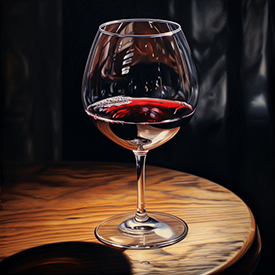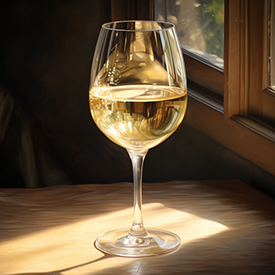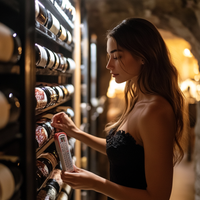Does Ambient Temperature Change How Wine Ages?
Posted by Matteo Lahm on 8th Nov 2024
You've just bottled your wine. You're excited about the prospect of savoring it in the future, but you're also aware that how you store it will significantly impact its taste. The key player in this game? Temperature. Let's dive into the chemistry of wine aging and how temperature plays a pivotal role in the thermodynamics of wine aging
The aging of wine is a fascinating process, a symphony of molecular interactions, that involves a multitude of chemical reactions. These reactions are influenced by various factors, but temperature is the conductor leading this intricate molecular orchestra.
Central to the process of wine aging are chemical reactions like oxidation, esterification, and polymerization. Each of these reactions contributes to the transformation of the wine's characteristics over time.
Oxidation is a reaction that occurs when wine compounds interact with oxygen. This process can lead to alterations in both the color and flavor of the wine. When a wine ages too quickly or for too long, oxidation can become excessive, leading to a loss of fruit flavors and the development of a brownish hue. The wine may take on a flat, stale taste, often described as being "oxidized."
Esterification is another key reaction in the aging process. It involves the interaction between the alcohols and acids present in the wine, resulting in the formation of esters. These esters contribute significantly to the wine's aroma. However, if the wine ages too rapidly or for an extended period, the balance of these esters can be thrown off. This imbalance can lead to a loss of the wine's original aromatic complexity, resulting in a wine that smells dull or even unpleasant.

Lastly, polymerization is a process that involves the linking together of tannin molecules. This reaction can influence the wine's color and the sensation it creates in the mouth, known as mouthfeel. When a wine ages too quickly or for too long, the polymerization process can go awry. The tannins can become overly polymerized, leading to a wine that feels harsh or astringent in the mouth. Alternatively, the wine's color may fade, and it may lose its vibrancy and become dull.
In essence, while aging can enhance a wine's complexity and depth, it's a delicate balance. If a wine ages too quickly or for too long, these chemical reactions can lead to undesirable changes, resulting in a wine that's past its prime.
Temperature plays a crucial role in these reactions. According to the principles of thermodynamics, chemical reactions generally proceed faster at higher temperatures. This is because heat provides the energy needed to overcome the activation energy barrier of these reactions, allowing them to occur more readily.
When you store wine at warmer temperatures, you're essentially providing more energy for these chemical reactions to take place. It's akin to putting your wine on a high-speed train. The warmer the temperature, the faster the train moves, causing the wine to age more rapidly.
However, it's important to note that while higher temperatures speed up these reactions, they can also lead to undesirable changes if not carefully controlled. This is why maintaining an optimal storage temperature is crucial for preserving the quality of the wine as it ages.
But why does this happen? It's all about the rate of reaction. In the world of chemistry, there's a rule of thumb known as the Arrhenius equation. This equation tells you that for every 10-degree Celsius increase in temperature, the rate of reaction doubles. So, if you're storing your wine at room temperature, you're essentially doubling the speed at which it would age in a wine cellar.

Now, you might be thinking, "Great, I'll just crank up the heat and have an aged wine in no time!" But hold your horses. Faster isn't always better.
When wine ages, it undergoes a series of changes. Tannins soften, flavors meld together, and new aromas and tastes develop. This process needs time to happen properly. If you rush it by cranking up the temperature, you risk throwing off the balance. The result? A wine that tastes cooked or overly mature.
So, what's the ideal temperature for storing wine? The consensus among wine experts is that 55 degrees Fahrenheit (or about 13 degrees Celsius) is the sweet spot. This temperature allows the wine to age at a steady, controlled pace, ensuring that all the chemical reactions happen in harmony.
In wrapping up, temperature is a pivotal player in the wine aging process. It's the puppeteer, orchestrating the complex dance of chemical reactions that elevate a good wine to a stellar one. However, it's crucial to remember that even if you store your wine correctly after bottling, wines exposed to room temperature have inherent aging limitations. This is due to the accelerated aging process triggered by warmer temperatures, a process that sadly can't be undone.
Moreover, wines that are properly fortified with the necessary amount of sulfites and stored under optimal conditions can age gracefully for many years. On the other hand, wines that are deficient in these crucial sulfites and/or have been subjected to room temperature conditions typically have a more limited lifespan. This also holds true for commercial wine. Light and medium bodied wines are even more limited due to their lower alcohol and less tannins.
Sulfite free wine has a much shorter life span, even with proper temperatures. Sulfite-free wine has a much shorter lifespan primarily because sulfites act as a preservative. They help to prevent oxidation and bacterial spoilage, both of which can degrade the wine's quality over time. Without sulfites, the wine is more susceptible to these damaging factors, leading to a quicker deterioration of its flavor and aroma. Therefore, even when stored under ideal conditions, sulfite-free wines tend to have a significantly shorter shelf life compared to their sulfite-containing counterparts.
So, the next time you bottle your wine, bear in mind not just to store it properly, but also to consider its storage history and sulfite content. Your future self, and your taste buds, will be grateful.
Remember, wine is not just a beverage. It's a journey through time, guided by temperature. So, treat it with the respect it deserves, and you'll be rewarded. Cheers!

